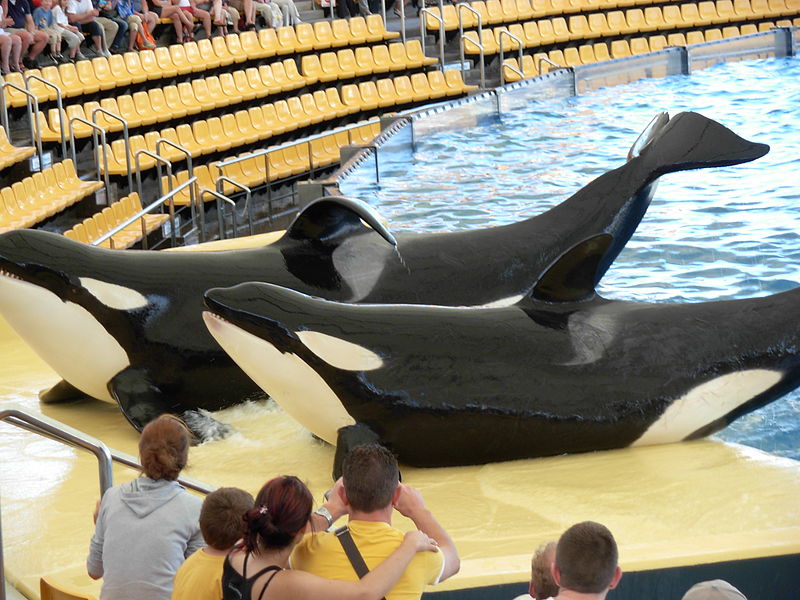Please, STOP Supporting Seaworld
November 21, 2018
Orcas performing a show in captivity at Loro Parque, a zoo in Europe. Notice the collapsed dorsal fin, which indicated stress and unhappiness.
Americans strive to be successful. We do anything to get money and be entertained. It has gone so far that everyday Americans have done awful things, like kidnapping babies and torturing the parents. You are probably wondering who would do such a thing. Well, the owners and tourist of SeaWorld is who. Seaworld has been capturing baby orcas, or killer whales, from their pod and putting them in concrete tanks to live and suffer, since 1970. It is far overdue that SeaWorld has finally agreed to stop breeding orcas in captivity and capturing them in the wild, and we need to continue to support laws that protect animals in captivity.
The most famous and sad cases of capturing orcas is that of Tilikum, who was the longest living orca in captivity. He lived 33 years after being captured. He was bred 21 times, and 11 of his children died before him. Tilikum was treated as an object, not a living thing. He was captured in Iceland when he was two years old and transferred to SeaLand, a public aquarium in British Columbia, Canada. He was paired with two other Orcas. He did not bond well with them, so they would often bully Tilikum. Even though they bullied him, Tilikum bred with one of the other Orcas and successfully had a newborn calf, the start of his fame in being the most successful breeding whale in captivity. He was then transferred to SeaWorld in Orlando. He became a key-part in the success of the Park, where he was trained for breeding, making more and more calfs that would be stuck in a concrete tanks for their whole lives. Tilikum lived a sad life for an orca, a social animal who craves interaction from others of their own species.
In captivity, orcas become frantic and aggressive due to the fact that they are taken away from their habitats and forced into confined tanks that leads to stress on the animals. It’s not only bad for the whales. Tilikum killed three humans in his 33 years of captivity. These deaths fired up the debate about orcas and if such large and unpredictable animals should be in captivity, working this close to humans.
Orcas are also abused in the way they are fed while in captivity. Killer whales are apex predators, or predators who are on the top of the food chain. In the wild, they eat seabirds, squids, seals, sharks and turtles. In SeaWorld, orcas are fed pig and cow bones, thawed out fish, and gelatin to keep them hydrated. Imagine being fed chicken bones and gelatin for the rest of your life? How would you feel? This is not an appropriate diet for anyone, let alone the orca.
SeaWorld has, time and time again, claimed their orcas are happy. However, the orca has a fin on the top of its body called the dorsal fin. A collapsed dorsal fin means the orca is unhealthy, unhappy or malnourished.In captivity, all adult male orcas have collapsed dorsal fins, which clearly is a sign that captivity is not a place for these creatures.
Adding to their unhappiness, orcas are highly sociable animals; some calves even stay with their mothers for life. When captured, orcas are put in tanks with different families of orcas, who speak different languages and act different ways, causing fights and attempts to escape. It gets to the point that some orcas even break their teeth trying to escape, which is what happened to Tilikum.
Orcas have lived as targeted species for over 50 years, with 48 orcas dying at SeaWorld’s three locations. The way orcas are living in captivity is just horrendous, and it took too long for SeaWorld to step up and right its wrongs. It is up to us, concerned citizens who care about living creatures, to step up and demand change from these corporations who do horrible things to animals, not just orcas.
Some things that can be done in the future to stop organizations like SeaWorld are: do not support businesses who keep orcas in captivity by being tourist to their parks or zoos, demand change in laws that protect active wildlife like orcas by signing petitions, support organizations that work to protect these wonderful animals and others by donating, and protest all forms of animal cruelty.

Ashley Stewart • Apr 15, 2021 at 10:51 pm
It’s not okay the things we do for money, it’s a form of slavery for the whales!!! To entertain people and at the very least to not get fed properly, hurts me as a human to know our kind is doing these things. If anything they need to be cared for an released back into the wild if possible but better than that, they should stop taking wild whales! I pray that God wakes them up and give them a realization of what they are doing and give them a change of heart to act on it! I pray this for all of us!!!
SAVE THE WHALES!!!